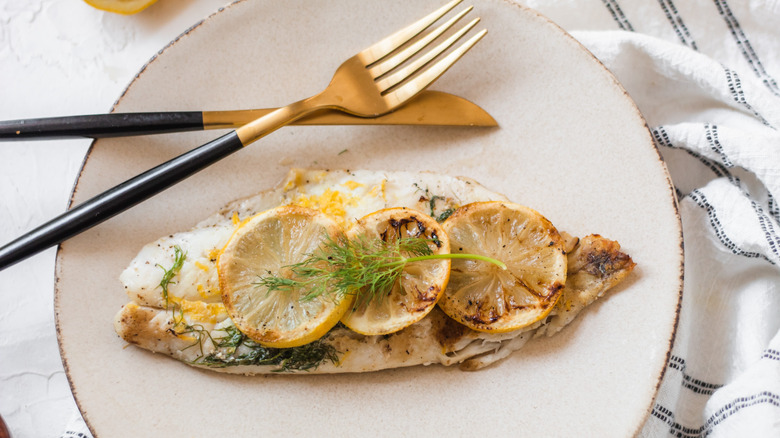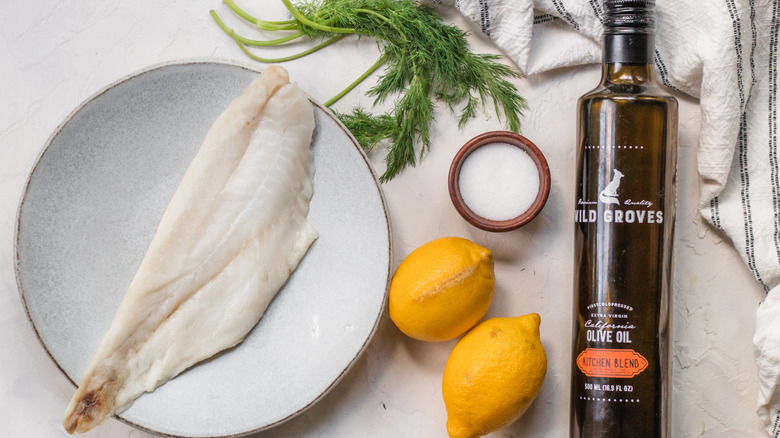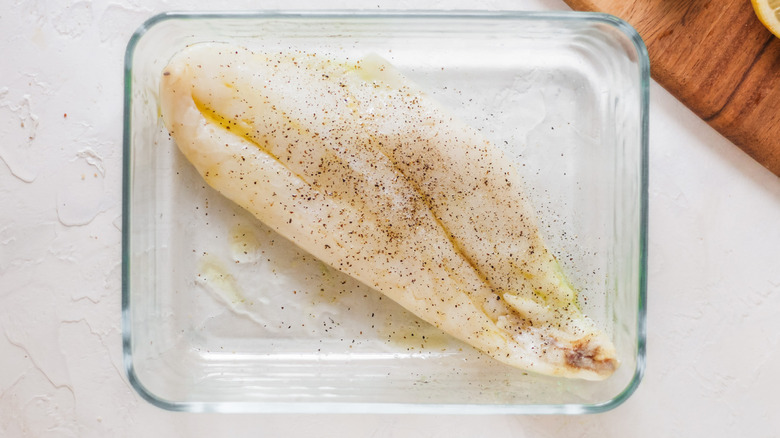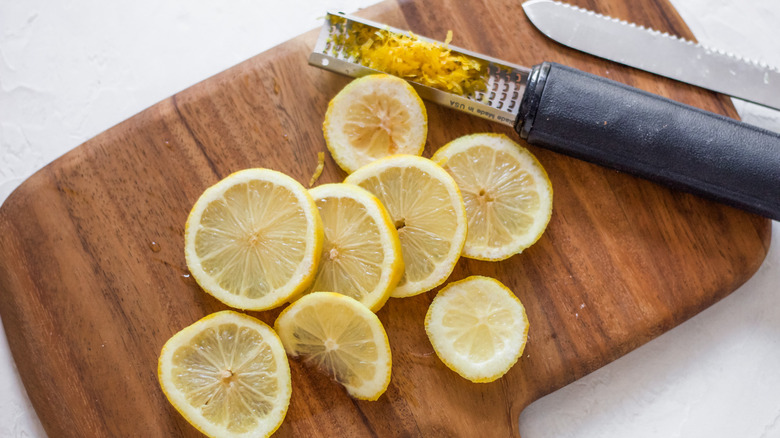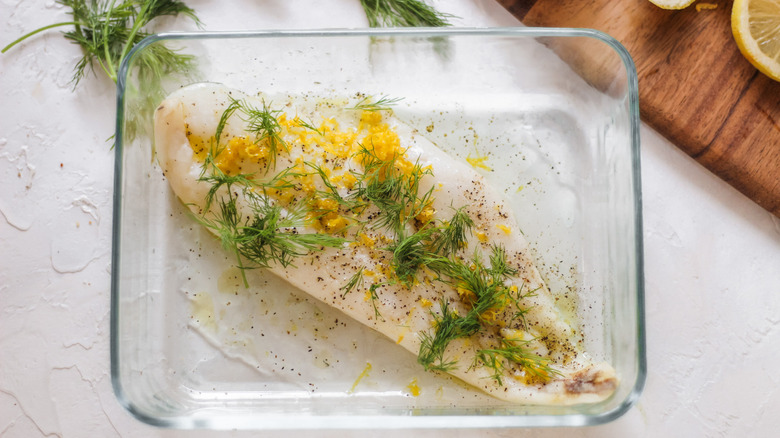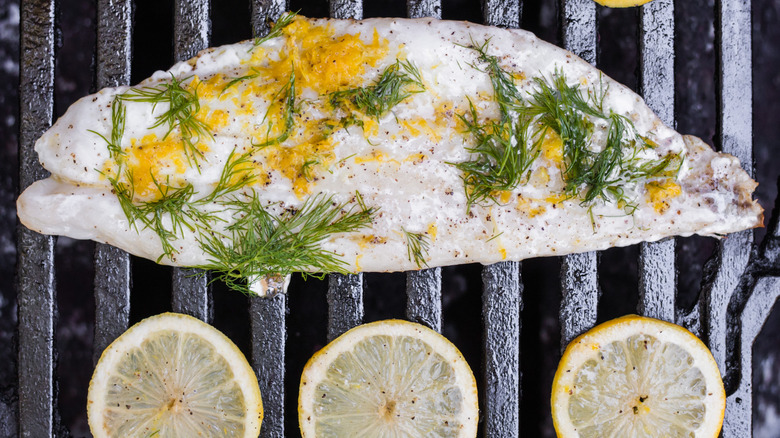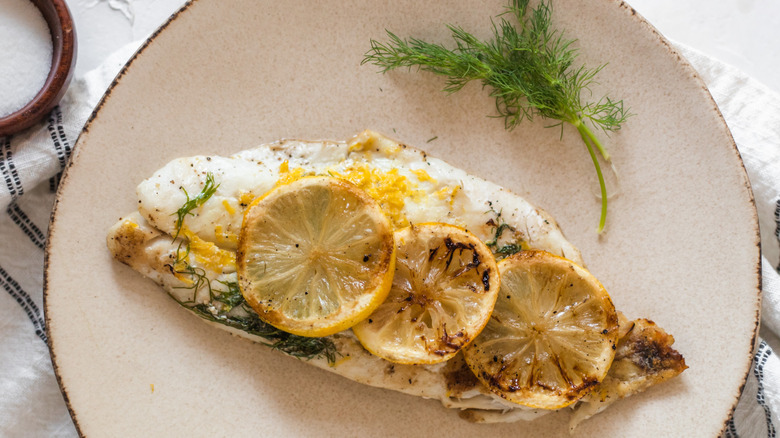Easy Grilled Orange Roughy Recipe
Orange roughy is truly a people-pleasing fish that doesn't have an overpowering "fishy" flavor and offers a nice, flaky texture. So if you're looking to add more fish to your diet, it's hard to go wrong with orange roughy. Of course, if you haven't spent much time cooking fish, it can feel a little intimidating at first. What if you overcook it? What if you don't like how it tastes? That's why it's a good idea to start with a grilled orange roughy recipe like this one, which was created by recipe developer Jaime Bachtell-Shelbert of Wholly Nourished.
This recipe is simple and beginner-friendly, making it a great option for a first foray into cooking fish. Bachtell-Shelbert just has one tip for making sure you're buying a good filet of orange roughy: "Look for a nice white filet that's firm and glossy." Because, of course, the best recipes start with high-quality ingredients!
Gather your ingredients to prepare grilled orange roughy
You won't need much to prepare your perfect orange roughy filet. Just remember, this recipe is for a single serving, so you can double, triple, or quadruple as needed depending on how many people you're cooking for. For a single serving, you'll want an 8-ounce filet, 2 tablespoons of extra-virgin olive oil (Just keep the bottle on the counter, as you'll want more for the grill.), ¼ teaspoon of salt, black pepper, 1 teaspoon of lemon zest, juice from half a lemon, and a large sprig of fresh dill. And, if you're so inclined, you can use extra slices of lemon for grilling and topping your filet — it just depends on how much you like that grilled citrus flavor.
Prep the orange roughy filet
Start your prep work by placing your orange roughy filet in a glass dish to season it. Using your 2 tablespoons of olive oil, drizzle both sides of the filet with the oil before sprinkling your salt and pepper on both sides as well. It's important to keep in mind that you may personally prefer more or less seasoning. After making the filet once, you can adjust how much salt or pepper you add in this step based on your personal preferences.
Add the lemon zest and juice
Go ahead and zest your lemons (Remember, you want a teaspoon worth of zest.) and squeeze the lemon juice from a half of a lemon. Sprinkle the zest on top of the orange roughy filet, and follow it up by pouring the juice over the fish.
Now's also when you should slice up additional lemon slices if you want to use them for grilling and topping your fish. And, if for any reason you can't find lemons in your area, feel free to sub in other citruses. "Certainly other citrus would work well," says Bachtell-Shelbert. "A combination of citrus juices would be lovely as well." So, feel free to get creative and mix lemon, lime, orange, or even grapefruit, depending on what you have on hand.
Top the orange roughy with fresh dill
Grab your sprig of dill, and pull the fronds off the stem to sprinkle the fresh dill on top of the orange roughy filet. "You could use dried dill, but fresh packs more flavor," Bachtell-Shelbert says. "The substitution ratio is one tablespoon [of] fresh dill to one teaspoon [of] dried dill." So, if you forgot to pick up fresh dill from the store, a pinch or two of dried dill will do the trick, but it might not have the freshness factor that makes this recipe so delightful.
Grill the orange roughy
You're now ready to grill your fish (and lemon slices, if desired). Simply heat a gas grill to medium heat, and brush the grates with olive oil. Place the fish filet on the grill with the lemon zest and dill facing down. If you're grilling the additional lemon slices, place them directly on the grate as well. Allow the fish and lemons to cook for about five minutes per side. The goal is for the fish to flake easily. Or, if you're using a thermometer, the fish should reach 145 F, as per Bachtell-Shelbert.
If you don't have a gas grill, don't fret, because you can use whatever grill you have. "No matter the type of grill, orange roughy filets cook up fairly quickly depending on the thickness," says Bachtell-Shelbert. "Heat any type of grill or even a grill pan on the stovetop to medium heat, and grill about five minutes on each side." Just be sure not to overcook this.
Serve the orange roughy filet
Your fish filet is now ready to be served! Plate the orange roughy, and top it with the extra lemon slices if you're using them. Consider serving the fish alongside long grain rice, a mango salsa and chips, an avocado and tomato salad, or even grilled veggies. The fish is incredibly versatile, so really, you can serve it with just about any side, but you want something light and fresh to complement the lemon and dill seasoning.
Easy Grilled Orange Roughy Recipe
This easy grilled orange roughy recipe is simple and beginner-friendly, making it a great option for a first foray into cooking fish.
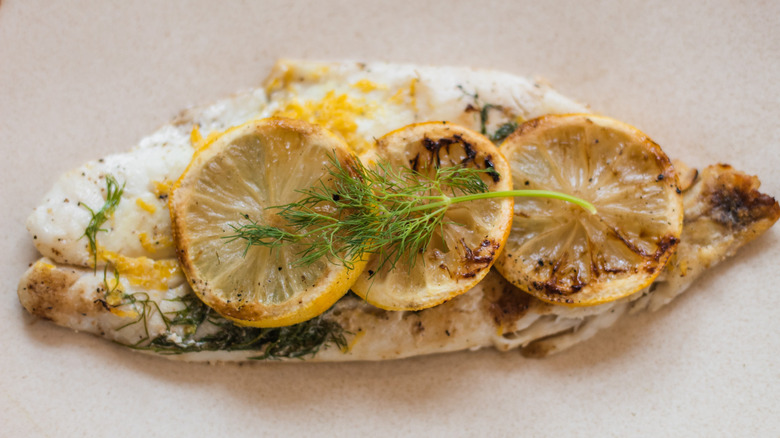
Ingredients
- 1 (8-ounce) orange roughy filet
- 2 teaspoons extra-virgin olive oil + extra for the grill grate
- 1/4 teaspoon salt
- black pepper, to taste
- 1 teaspoon lemon zest
- juice from 1/2 lemon
- 1 large sprig of dill
Optional Ingredients
- lemon slices, for grilling and topping
Directions
- Place the fish in a glass dish. Drizzle both sides of the orange roughy with the olive oil. Salt and pepper both sides as well.
- Sprinkle the lemon zest on the top of the filet, and then pour the lemon juice over the filet.
- Pull the fronds from the dill stem, and sprinkle atop the orange roughy.
- Heat a gas grill to medium heat. Brush the grate with olive oil.
- Place the filet herb and zest side down. (If grilling the lemon, place the slices directly on the grate as well).
- Cook the fish and lemons for about 5 minutes per side, until the fish flakes easily or reaches 145 F.
- Plate the grilled orange roughy, and top with lemon slices, if desired.
Nutrition
| Calories per Serving | 263 |
| Total Fat | 10.7 g |
| Saturated Fat | 1.3 g |
| Trans Fat | 0.0 g |
| Cholesterol | 136.1 mg |
| Total Carbohydrates | 3.6 g |
| Dietary Fiber | 1.2 g |
| Total Sugars | 0.8 g |
| Sodium | 622.9 mg |
| Protein | 37.7 g |
